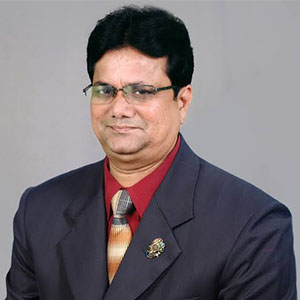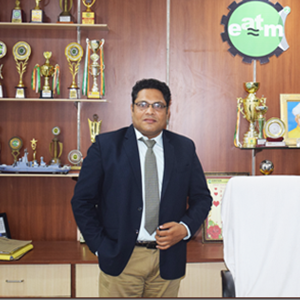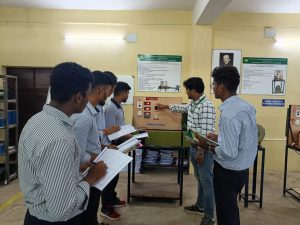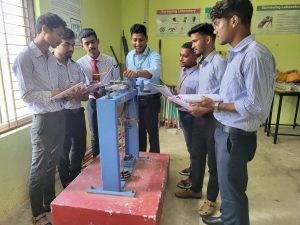Electronics And Communication Engineering
- Introduction
- HOD's Message
- Faculty Members
- Vision & Mission
- Courses Offered
- COs
- POs
- PEOs & PSOs
- Laboratory Facilities
- Opportunities
- Achievements
-
Seminar, Workshop,
Conference, FDP, STTP - Value Added Courses
- Student Project/Internship
The Department of Electronics & Communication Engineering was established in the year 2009, with an intake of 60. Electronics & Communication engineering is one of the older branches of engineering, and dates back to the late 20th century. Electronics & Communication Engineering deals with the electronic devices, circuits, communication equipments like transmitter, receiver, integrated circuits (IC). It also deals with basic electronics, analog and digital transmission & reception of data, voice and video (Example AM, FM, DTH), microprocessors, satellite ……Currently; it has 10 faculty members and over 100 students working towards their development.
What does an Electronics & Communication Engineer do?
All of the applications which make our life easier and enjoyable such as Television, Radio, Computers, Mobiles etc. are designed and developed by Electronics and Communication Engineers
- Design and maintain satellites, which bring TV, telephone and Internet service into remote and rural regions.
- ECE Engineers also creates advanced communication facilities like video conferencing which bring people together from all over the world.
- Develops programs for various control and communication systems.
It is my pleasure and honor to welcome you to the Department of Electronics and Communication Engineering of Einstein Academy of Technology & Management which is one of the premier institutions of East India, unique like a prism reflecting the manifold shades of learning and co-curricular activities.
The Department of Electronics and Communication Engineering bequeaths students with the capability to apply knowledge of Electronics and Communication Engineering to work efficiently in multidisciplinary teams, endow with leadership and technical expertise, and practice engineering with ethical approaches.
The Department has excellent lab facilities which are being upgraded from time to time and provide ample opportunities for the students to learn and innovate. The Department organizes interactive lectures and Faculty Development Programs/ Seminars by inviting Educationists and Technocrats from industries for the overall development of students as well as for faculties.
This website provides an overview of the academic programs, research activities, various laboratories and profiles of faculty members along with details of the students. We hope that whether you are a prospective undergraduate or graduate student, or work in industry, or another Institute/University, or a visitor, you will find this website informative.
Thank you for visiting us.To emerge as leader in the field of Electronics & Communication Engineering and help the students to become successful professionals in their respective fields.
- To provide the best education in the field of Electronics & Communication Engineering to the students.
- To motivate and facilitate the students to engage in research and development activities.
- To prepare high quality Electronics and Communication engineers with the ability to meet the current demands of the industry.
- To prepare students to compete in the global environment.
|
Under Graduate (B. Tech) |
Electronics & Communication Engineering (60 Intake)
|
Programme Outcomes (POs)
PO1: Engineering knowledge: Apply the knowledge of mathematics, science, engineering fundamentals, and an engineering specialization to the solution of complex engineering problems.
PO2: Problem analysis: Identify, formulate, review research literature, and analyze complex engineering problems reaching substantiated conclusions using first principles of mathematics, natural sciences, and engineering sciences
PO3: Design/development of solutions: Design solutions for complex engineering problems and design system components or processes that meet the specified needs with appropriate consideration for the public health and safety, and the cultural, societal, and environmental considerations.
PO4: Conduct investigations of complex problems: Use research-based knowledge and research methods including design of experiments, analysis and interpretation of data, and synthesis of the information to provide valid conclusions.
PO5: Modern tool usage: Create, select, and apply appropriate techniques, resources, and modern engineering and IT tools including prediction and modeling to complex engineering activities with an understanding of the limitations.
PO6: The engineer and society: Apply reasoning informed by the contextual knowledge to assess societal, health, safety, legal and cultural issues and the consequent responsibilities relevant to the professional engineering practice.
PO7: Environment and sustainability: Understand the impact of the professional engineering solutions in societal and environmental contexts, and demonstrate the knowledge of, and need for sustainable development.
PO8: Ethics: Apply ethical principles and commit to professional ethics and responsibilities and norms of the engineering practice.
PO9: Individual and team work: Function effectively as an individual, and as a member or leader in diverse teams, and in multidisciplinary settings.
PO10: Communication: Communicate effectively on complex engineering activities with the engineering community and with society at large, such as, being able to comprehend and write effective reports and design documentation, make effective presentations, and give and receive clear instructions.
PO11: Project management and finance: Demonstrate knowledge and understanding of the engineering and management principles and apply these to one’s own work, as a member and leader in a team, to manage projects and in multidisciplinary environments.
PO12: Life-long learning: Recognize the need for, and have the preparation and ability to engage in independent and life-long learning in the broadest context of technological change.
PROGRAM EDUCATIONAL OBJECTIVES (PEOs)
PEO 1: Graduates shall have sound knowledge of the fundamental and advanced concepts of electronics and communication engineering to analyze, design, develop and implement electronic systems or equipment.
PEO 2: Our graduates have successful careers in industry, Entrepreneurship, higher education & research by balancing their social commitments.
PEO 3: Our graduates shall work as a team & adapt to changes taking place in their field through continuous learning processes.
PROGRAM SPESIFIC OUTCOMES (PSOs)
PSO 1: Utilize the fundamental knowledge of mathematics to identify and solve the complex problems related to electronics devices and circuits, communication systems, digital systems, electromagnetic etc.
PSO 2: Apply research based knowledge, modern engineering tools to analyze the electronics & communication engineering problems.
PSO 3: Apply the theoretical and practical knowledge of electronics and communication engineering to society for environmental growth, safety and manage different projects in multidisciplinary environments as the process of lifelong learning.
1: Apply the knowledge of mathematics, science, engineering fundamentals, and an engineering specialization to the solution of complex engineering problems.
2: Identify, formulate, review research literature, and analyze complex engineering problems reaching substantiated conclusions using first principles of mathematics, natural sciences, and engineering sciences.
3: Design solutions for complex engineering problems and design system components or processes that meet the specified needs with appropriate consideration for the public health and safety, and the cultural, societal, and environmental considerations.
4: Use research-based knowledge and research methods including design of experiments, analysis and interpretation of data, and synthesis of the information to provide valid conclusions.
5: Create, select, and apply appropriate techniques, resources, and modern engineering and IT tools including prediction and modeling to complex engineering activities with an understanding of the limitations.
6: Apply reasoning informed by the contextual knowledge to assess societal, health, safety, legal and cultural issues and the consequent responsibilities relevant to the professional engineering practice.
7: Understand the impact of the professional engineering solutions in societal and environmental contexts, and demonstrate the knowledge of, and need for sustainable development.
8: Apply ethical principles and commit to professional ethics and responsibilities and norms of the engineering practice.
9: Function effectively as an individual, and as a member or leader in diverse teams, and in multidisciplinary settings.
10: Communicate effectively on complex engineering activities with the engineering community and with society at large, such as, being able to comprehend and write effective reports and design documentation, make effective presentations, and give and receive clear instructions.
11: Demonstrate knowledge and understanding of the engineering and management principles and apply these to one’s own work, as a member and leader in a team, to manage projects and in multidisciplinary environments.
12: Recognize the need for, and have the preparation and ability to engage in independent and life-long learning in the broadest context of technological change.
Electronics and Communication Engineering graduates find opportunities in the terrestrial and extra terrestrial communication systems like telephones, cellular phones, television, optical fiber communication, consumer and entertainment devices and space programs research.
The field of Electronics and Communication is one of the imperative branches in engineering. This department has a team of dedicated, talented, well qualified and an experienced teaching faculty. The department also has qualified and dedicated supporting staff for our laboratories. This course covers a wide range of topics centered around radio based communications, radar systems. It has a long tradition of excellence in electromagnetism and its application and continues to exploit with a combination of fundamental and applied research. The topics covered range from antennas, through microwave circuits, radio-wave propagation, optics, networking and radar, to communications signal processing.
Page Under Construction..
- MATLAB
- VHDL/VERILOG
- INDUSTRIAL AUTOMATION
- ADVANCE DIPLOMA IN VLSI & EMBEDDED SYSTEMS
- ADVANCE DIPLOMA IN MACHINE MAINTENANCE & AUTOMATION
- JAVA & ANDRIOD
- PROGRAMMING IN C







